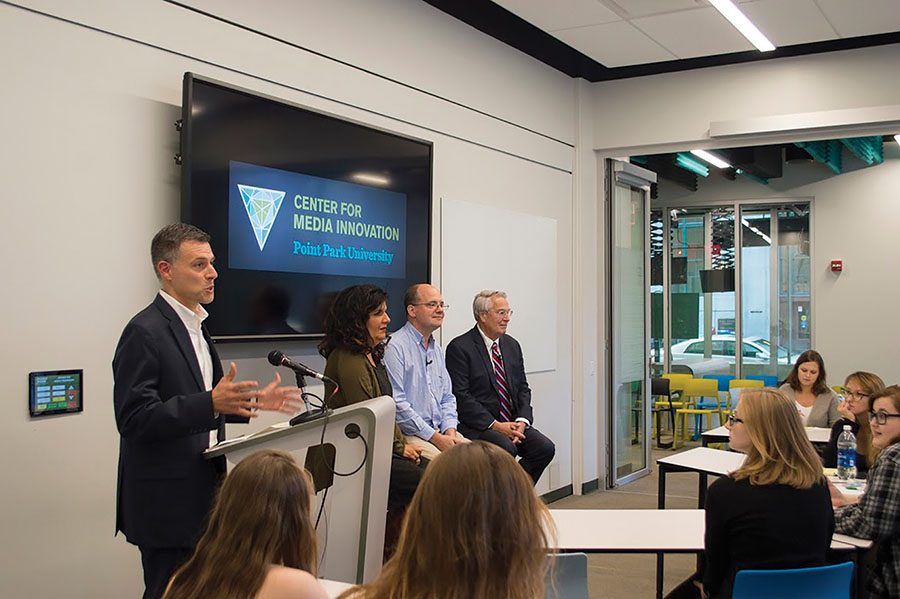Local journalists share experiences from campaign trail
Photo by Shayna Mendez
CMI Director Andrew Conte introduces local journalists Salena Zito, Chris Potter and Jon Delano for a panel about their stories covering the presidential campaign trail Tuesday, Sept. 27 in the CMI.
October 4, 2016
Three Pittsburgh-based political reporters shared stories from covering candidates on the campaign trail Tuesday, Sept. 27 in the Center for Media Innovation. The panel began a scheduled series of speakers leading up to the Nov. 8 general election.
The panel was structured as a question-and-answer session with Salena Zito, former columnist at the Pittsburgh Tribune-Review, Chris Potter, a political reporter with the Pittsburgh Post-Gazette and Jon Delano, Money and Politics editor at KDKA-TV.
The challenge that Potter and Delano pointed out was how to localize national issues in an effort to explain how complex things such as foreign policy impact voters.
“I feel a certain degree of responsibility because the truth is that most folks in Western Pennsylvania are not watching CNN. They never watch MSNBC, and they hardly ever watch FOX. They’re not watching these cable news stations,” Delano said. “They’re getting their local political news; they’re getting their national political news, from what we’re putting on local television. That’s really how they get their news.”
Zito echoed Delano’s sentiment and said she watched the first presidential debate in a Westmoreland County bar for coverage in the New York Post on rural Pennsylvania voters.
“People in the bar said the same thing,” Zito said. “They’re saying, ‘I don’t care about anything they’re talking about.’ They watched the debate – they didn’t move from that debate – but as soon as the pundits started talking and telling them how they should think, they’re out.”
Delano said he was given only eight minutes for a recent interview with former Secretary of State Hillary Clinton and former Senator Tim Kaine, and striking a balance between asking about Primanti sandwiches and foreign policy is a tough task to accomplish.
In a year where candidates and supporters shame the media, the panelists explained that both depend on each other to be successful.
“I try to look at candidates in a different lens,” Zito said. “I try to give the reader something else besides the same thing they’re going to hear on CNN or talk cable and give them something that maybe they can relate to and see a different side.”
Panelists discussed the rise of what they referred to as “populist” candidates like Donald Trump and Bernie Sanders, as well as how reporters treat the candidates and how campaigns treat reporters.
“If you look historically, [populism] wasn’t just opposed to government…it was also opposed to railroads and the power of corporations,” Potter said. “If you’re looking at this election as a purely anti-government thing, it’s not just about government but it’s about the connection between government and corporate power.”
The panelists emphasized that no matter how much analysis is done by pundits and how much history is expected to dictate the future, what matters in the end is how the sentiments of voters carries to the polls. What voters truly care and know about the candidates will inform their voting decision.
“This state is really up for grabs,” Delano said. “There’s so much unknown [about the election]. The candidates and their surrogates are going to be all over us, I believe for the next six weeks. Hopefully, from a media standpoint that we’ll be able to talk to them a number of times between now and Nov. 8. The bottom line is that all of us, as Pennsylvanians, are real deciders in this 2016 election.”
The next installation of the series will feature speakers from the campaigns and will take place Oct. 18 at the Center for Media Innovation.



















